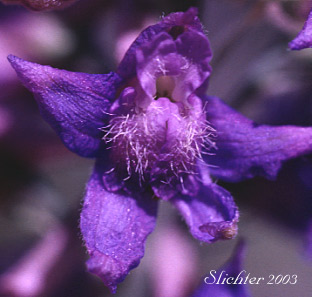 The
photo at right represents a close-up, frontal view of the flower of tall mt. larkspur as seen near the intersections of forest roads 41 & 43, Ochoco N.F.........July
14, 2003. Note the long whitish hairs on the lower petals, each of which is very
shallowly notched.
The
photo at right represents a close-up, frontal view of the flower of tall mt. larkspur as seen near the intersections of forest roads 41 & 43, Ochoco N.F.........July
14, 2003. Note the long whitish hairs on the lower petals, each of which is very
shallowly notched.
Tall mountain larkspur is also known as hedgenettle larkspur. It is a large, stout, larkspur with several to many hollow stems rising from 100-200 cm high. The herbage of the stems typically consists of numerous crisp hairs, which may be greenish or frequently grayish in color. The leaves are abundant and uniformly spaced to well up the stems. The lowermost leaves are long petiolate and often are drying and withering by the time flowering commences. The upper stem leaves are subsessile. The blades are 5-12 cm wide, often glabrous, and dissected lobes are are further dissected into narrowly oblong to linear-lanceolate segments.
The inflorescence is a narrow panicle up to 60 cm long. The terminal raceme is closely flowered. The pedicels range from 8-18 mm long, much shorter than to much longer than the calyx spur. If the latter is the case, the pedicels are strongly ascending. The sepals are dull blue to lilac in color, fairly narrow, and from 10-13 mm long. They are covered with a grayish tomentum of fine hairs which are never glandular. The sepals are cupped forward rather than spreading. The stout, blunt spur is similar in length to the sepals. The petals are dull blue to yellowish. The lower pair are shallowly notched and covered with long hairs. The fruits are held erect, 10-16 mm long, and gray hairy.
Tall mountain larkspur is found on dry slopes with sagebrush, or with ponderosa or lodgepole pine at middle altitudes.
Tall mountain larkspur is found from the Blue Mts. of central Oregon east to southwestern and southern Idaho, and south to Nevada and northeastern California.
The photo at left shows a cluster of stems of tall mt. larkspur as seen just east of Whiskey Flats, Malheur N.F.......July 15, 2003. The photo at right shows tall mountain larkspur as seen on dry mesas at the southeastern corner of Hart Mt. National Antelope Refuge.........June 10, 2016.